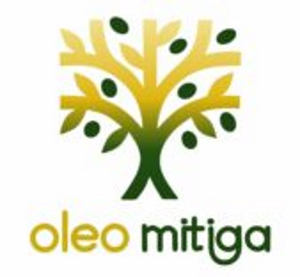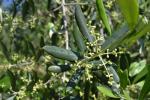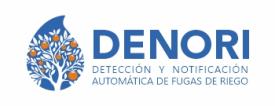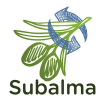
OLEO MITIGA Operational Group: Application of models and valorization in carbon markets of mitigation technologies based on good management practices in traditional olive groves
- Type Operational group
- Status In progress
- Execution 2023 -2025
- Assigned Budget 299.938,00 €
- Scope Autonómico
- Autonomous community Andalucía
- Project website GO OLEO MITIGA
The 2023 National Greenhouse Gas Emissions Inventory Report, published by MITECO, reveals that the agricultural sector accounts for 11.9% of GHG emissions in Spain. However, this sector has the potential to act as a carbon sink through nature-based practices, which can be certified according to ISO 14064-2:2019 and ISO 14064-3:2019 standards to ensure the accuracy and credibility of the reported data.
Benefits for farmers: GHG reduction certification allows access to carbon markets, earning income from carbon credits and improving soil and biodiversity sustainability. It also strengthens the sector's environmental image, promoting resource efficiency and cost reduction. Validation and verification: Standards such as the Golden Standard and ISO guide the quantification and verification of emissions for consistent and verifiable results. GHG validation is critical to the integrity of climate efforts. With ISO 14064 standards, olive farms can effectively contribute to emissions reduction and be recognized in carbon markets.
Current practices for carbon capture and mitigation in olive groves include sustainable techniques that improve soil health and reduce CO2 emissions. These practices include conservation tillage, which reduces soil disturbance and limits herbicide use, preventing carbon oxidation.
The incorporation of pruning waste is also used, increasing organic matter and improving water retention and soil structure. Mulching olive groves is another key practice, as it captures CO2 and promotes biodiversity, improving infiltration and microbial activity. The use of manure, compost, and humus enriches the soil with nutrients and organic matter, benefiting microbial activity. The use of herbicides and phytosanitary products is also reduced, adopting integrated management to minimize CO2 emissions.
Optimizing irrigation in irrigated olive groves improves water and energy efficiency, promoting biomass development. Integrated livestock farming contributes to biomass control and generates natural fertilization. These practices are complemented by the reduction of synthetic fertilizers, favoring low-carbon footprint products for more sustainable management.
The Oleo Mitiga Operational Group is leading an innovative project that transforms traditional Andalusian olive groves into an ally against climate change. Supported by agricultural and environmental experts, this project seeks to transform olive groves into net sinks for greenhouse gases (GHG).
Carbon credits are key in this fight, allowing companies to offset their emissions through investments in projects that reduce or capture carbon. Farmers yearn for economic incentives that recognize sustainable practices already implemented, aligning with the Common Agricultural Policy (CAP) and eco-regimes.
Oleo Mitiga, which collaborates with several entities, focuses on developing models that leverage carbon markets through mitigation technologies. Its work covers four areas: emissions mitigation, monitoring, carbon markets, and communication.
The project also promotes group audits to reduce monitoring costs and foster collaboration among farmers, turning olive groves into effective carbon sinks and contributing to climate change mitigation.
The Oleo Mitiga Operational Group is leading an innovative project to implement models and leverage carbon markets through mitigation technologies in traditional Andalusian olive groves. With the participation of AMBIENTA, the ETSIAM of the University of Córdoba, and REALIMA, and the support of partners such as ASAJA CÓRDOBA, the project evaluates the impact of these technologies as net greenhouse gas sinks.
Funded by the European Agricultural Fund for Rural Development (EAFRD) and the Regional Government of Andalusia, it addresses the urgent need for climate change mitigation measures. Approximately 30% of contributions to the Paris Agreement include land-use-based initiatives, but there are uncertainties regarding their effectiveness. Oleo Mitiga focuses on land-based mitigation technologies (LMTs) and addresses challenges such as erosion and nutrient loss. The project's four lines of work include mitigation technologies, monitoring, carbon markets, and outreach, with the aim of converting olive groves into carbon sinks and improving their sustainability and competitiveness.
Oleo Mitiga focuses on developing models that leverage carbon markets through mitigation technologies. Its work spans four areas: emissions mitigation, monitoring, carbon markets, and communication.
- Good practices. Conservation, soil regeneration, and carbon storage. Efficient water and nutrient circulation.
- Good practices. Vegetation management in olive groves and Mediterranean forests.
- Carbon monitoring in traditional olive groves. In situ techniques in soil and biomass.
- Carbon monitoring in traditional olive groves. Remote sensing techniques.
- Model building and scaling from monitoring.
- Traditional olive groves and carbon markets.
- Validation of carbon storage measurement methodologies in traditional olive groves.
- Outreach and communication to farmers and stakeholders.
Traditional olive groves face numerous problems related to the loss of soil and nutrients, erosion and sedimentation, and the hydrological cycle, which impact productivity, yields, and economic and environmental sustainability, both from the perspective of maintaining the activity in conditions of competitiveness in the medium term, and from the perspective of resource efficiency and its impact on riparian ecosystems, and even the clogging of reservoirs or flooding downstream of the basin that can affect infrastructure and the civilian population.
Approximately 30% of the Paris Agreement's Nationally Determined Contributions (NDCs) include land-based mitigation measures, but significant uncertainties remain regarding their effectiveness in generating negative emissions. Land-use mitigation technologies can play a crucial role in global efforts to achieve the Paris Agreement's goals.
Considering the land-climate-development interface, the Oleo Mitiga Operational Group aims to assess the impact of mitigation technologies applied to traditional Andalusian olive groves as net greenhouse gas (GHG) sinks by applying a unique mixed-methods approach.
Negative Emissions Mitigation Technology (LMTs). Techniques and methodologies for monitoring and modeling the carbon sequestration and storage potential of traditional olive groves. Traditional olive groves and carbon markets. Economic potential of olive groves in carbon markets. Outreach and communication to farmers and stakeholders.
- Coordinator/entity name: Ambienta Engineering and Agricultural and Forestry Services SL
- Postal address: Calle Pocillo de Gilván 20
- Coordinator/entity email: fjulian.ambienta@gmail.com
- Telephone: 666169888
The Oleo Mitiga Operational Group assesses the potential and viability of LMTs in the traditional olive grove sector by:
a) The quantitative assessment of the environmental, socio-economic and collateral benefits and trade-offs identified through a set of monitoring tools and a modelling system (including land use).
b) Quantitative assessment of environmental, social and economic benefits, co-benefits and trade-offs guided by stakeholder engagement.
c) The exploration of added value for traditional olive groves in carbon markets.
This mixed-methods approach allows us to provide a more detailed view of the effectiveness and climate resilience of LMTs at different spatial scales, for example, from the plot/farm level to the county/regional level. These tools, services, and approaches will contribute to the private sector and policymakers' decision-making regarding land-based LMTs applied to traditional olive groves.
The disadvantages of these traditional olive groves—typically dryland, with lower yields, lower planting densities, and location on sloping terrain that makes agricultural work and its mechanization difficult—do not seem to be offset, at least economically, by their positive environmental, landscape, social, and territorial externalities. These good practices also have an innovative added value, a new concept that, if compatible, would represent a true revolution, providing an additional resource for the management of traditional olive groves and farms.
The integrated management of traditional olive groves and their areas of influence allows for holistic and comprehensive objectives. Soil protection from a hydrological perspective is directly related to the hydrological cycle and, therefore, water management, vegetation utilization, and therefore the landscape, biodiversity, and ecosystem services. These measures are also essential for the adaptation of traditional Andalusian olive groves to climate change, which face significant threats such as drought and desertification in this region. Developing agricultural land technologies and agroecosystem services also offer opportunities for olive groves to mitigate climate change by increasing carbon sequestration and incorporation into the soil.
- Ambienta Ingeniería y Servicios Agrarios y Forestales S.L.
- Universidad de Córdoba. Escuela Técnica Superior de Ingeniería Agronómica y de Montes. (ir1peala@uco.es)
- Realima S.L. (realima.dt@gmail.com)
- ASAJA Córdoba (amonclova@asajacordoba.es)
- Cooperativa del Campo San Antonio Abad S.C.A (aj.algar.santacruz@gmail.com)
- ASAJA Andalucía (https://www.asaja-andalucia.es/contacto/)
- Ambienta Ingeniería y Servicios Agrarios y Forestales S.L.







